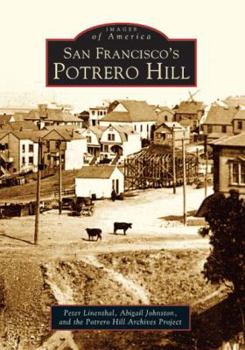San Francisco's Potrero Hill
(Part of the Images of America: San Francisco Series and Images of America: California Series)
Select Format
Select Condition 
Book Overview
In the early 1800s, it was called the Potrero Nuevo, or "new pasture." Gold-rush squatters
soon put the squeeze on Mission Dolores's grazing cattle, and when the fog lifted, Potrero Hill became the first industrial zone in San Francisco, with iron-smelting plants, butcheries, and shipbuilding dominating the waterfront during the late 19th century. The Hill has been home to immigrants from Scotland, Ireland, China, Russia, Mexico, and from everywhere in between. These days, many of the factories and warehouses have been converted into housing and offices for techies. And for the record, the crookedest street in San Francisco is not Lombard--it's Vermont, between 20th and 22nd.
soon put the squeeze on Mission Dolores's grazing cattle, and when the fog lifted, Potrero Hill became the first industrial zone in San Francisco, with iron-smelting plants, butcheries, and shipbuilding dominating the waterfront during the late 19th century. The Hill has been home to immigrants from Scotland, Ireland, China, Russia, Mexico, and from everywhere in between. These days, many of the factories and warehouses have been converted into housing and offices for techies. And for the record, the crookedest street in San Francisco is not Lombard--it's Vermont, between 20th and 22nd.
Format:Paperback
Language:English
ISBN:0738529370
ISBN13:9780738529370
Release Date:August 2005
Publisher:Arcadia Publishing (SC)
Length:128 Pages
Weight:0.65 lbs.
Dimensions:0.4" x 6.5" x 9.4"
Customer Reviews
1 rating
Detailed, Compact Photo History of a Neat Place
Published by Thriftbooks.com User , 18 years ago
"San Francisco's Potrero Hill" is one of a series of books giving an exactly 128-page photographic history of a specific neighborhood of the city. After reading eight of these books, I have to say the Potrero Hill edition has the tightest writing, the most detailed captions, and the widest scope of the lot. The book tackles the geological origins of the hill and how the native tribes, the settlement at Mission Dolores, and growing San Francisco made economic and other use of the hill. We see foraging, cattle grazing, beer-making, and ship-building. We see panoramic views, Victorian houses, schools (including the start of the Lick-Wilmerding School), early hospitals, and housing projects. There are economics, sociology, and local politics. The pictures are varied by content, provider, and date. For its size, this book is tough to beat for its topic. As a resident elsewhere in the city, I might have liked a bit more on the rise of San Francisco General Hospital (including the public emergency room and famous AIDS ward) and a bit more on the pale water tower very visible on the crest from the west, on the local parks, and on the impact of highways. All books in the series have to be selective and oriented toward the past; so this criticism is directed more at the publishers than at the authors, who did fine. Highly recommended.





